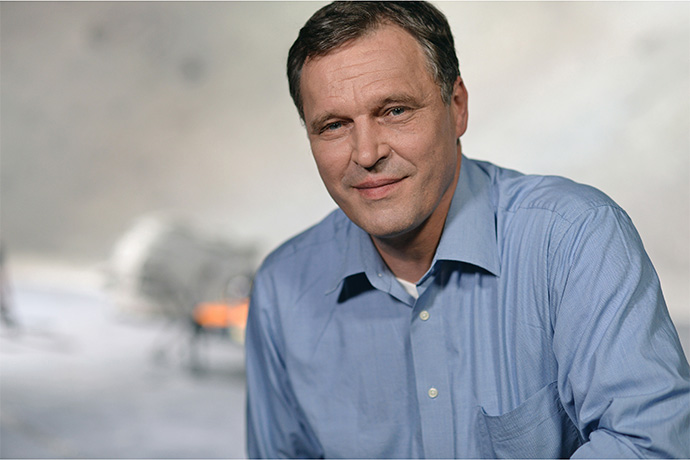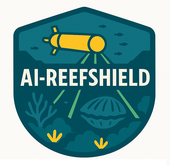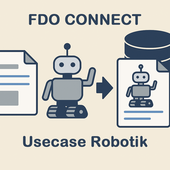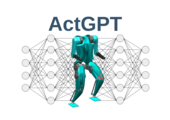
Executive Director DFKI Bremen & Head of the Research Department Robotics Innovation Center
Prof. Dr. Dr. h.c. Frank Kirchner
Organizational unit
Robotics Innovation Center
Contact
+49 421 17845 4101
(Bremen)
https://robotik.dfki-bremen.de/de/ueber-uns/mitarbeiter/frank-kirchner/lebenslauf
Address
(Bremen)
Robert-Hooke-Straße 128359 Bremen

Publications
All publicationsProfile
Short Biography
Frank Kirchner is Executive Director DFKI Bremen and in charge of the research department „Robotics Innovation Center“ with more than 100 employees. Founded in 2006 as a DFKI laboratory in Bremen, the institute is building upon the fundamental research of the Robotics Research Group led by Kirchner at the University of Bremen. Since 2002, the university professor has held the chair for robotics in the faculty of mathematics and computer science. Kirchner studied and obtained his doctorate at the University of Bonn and worked as a senior researcher at the Gesellschaft für Mathematik und Datenverarbeitung (GMD) in Sankt Augustin and at the Faculty of Electrical Engineering at Northeastern University in Boston (USA). In 2013, under Kirchner’s leadership and following the model of the DFKI, the Brazilian government founded the "Brazilian Institute of Robotics" in Salvador da Bahia, where he was the Scientific Director during the development phase. There he was awarded an honorary doctorate in 2017 for his achievements in the field of robotics and artificial intelligence. Frank Kirchner is one of the leading experts in the field of biologically inspired behavior and motion sequences of highly redundant, multifunctional robot systems. In addition, he supervises a variety of doctoral theses, is a regular reviewer for a number of international scientific journals and conferences and is the author of more than 350 publications in the field of robotics and AI. In 2015, Frank Kirchner was elected and accepted as a member of the Berlin Brandenburg Academy of Sciences and Humanities (BBAW).
Academic Positions
- 2020– Executive Director DFKI Bremen
- 05.11.2018 Appointment as Research Fellow of the Tsinghua University Beijing
- 31.07.2017 Awarded Honorary Doctorate by the Centro Universitário SENAI CIMATEC, Brazil for contributions in the area of robotics and artificial intelligence.
- 2017– Co-Founder of the ‘Schwerpunkt Program’ Softrobotics at the German Research Foundation (DFG)
- 2016– Associate Professor at the University CIMATEC, Senai, Bahia, Brasilien
- 2015– Member of the Berlin-Brandenburg Academy of Sciences and Humanities
- 2013– Scientific Director of the Brazilian Institute of Robotics (BIR) in Salvador, Bahia. The BIR is an institute formed by the involvement of the two non-profit organizations: Senai Cimatec and the DFKI focused on developing robots in Brazil.
- 2010– Initiator and co-founder of the “Institut für Maritime Technologien“ (MarTech) at the University of Bremen
- 2009–2013 Member of the Advisory Board and Co-coordinator of the Personal Mobility Center (PMC) of the Electric Mobility Model Region NorthWest
- 2009–2010 Initiator of the joint project „Maritime Intelligente Meerestechnologien für das 21. Jahrhundert“ (MarIT21)
- 2008– Spokesman of the Bremen location of the German Research Center for Artificial Intelligence (DFKI) which was inaugurated in February of 2008.
- 2005– Head of the Robotics Group at the University of Bremen and speaker of the newly founded Bremen laboratory of the German Research Center for Artificial Intelligence (DFKI)
- 2002– Holder of the chair of Robotics at the Faculty of Mathematics and Computer Science at the University of Bremen
- 2002– Appointment as Full Professor – C4 – at the University of Bremen
- 1999–2002 Appointment as Tenure Track Assistant Professor at the Northeastern University in Boston (MA, USA); management of a series of national German and US-American projects focusing on autonomous intelligent robots in real-world applications in cooperation with the MIT (Boston) and the National Space Agency NASA.
- 1998–1999 Senior Scientist und Principal Investigator at the Northeastern University in Boston (MA, USA), setting up a branch of the Fraunhofer Institute for Autonomous Intelligent Systems; team leader of the workgroup Biomimetic Autonomous Robots (BAR)
- 1997–1998 Head of Department “Biomimetische Autonome Roboter (BAR)“ at the Institut für Autonome Intelligente Systeme (AIS) der FHG, Sankt Augustin
- 1996–1997 Project leader at the Gesellschaft für Mathematik und Datenverarbeitung (GMD) in Sankt Augustin
- 1994–1996 Researcher at the Gesellschaft für Mathematik und Datenverarbeitung (GMD) in Sankt Augustin
Education
- 1999 Doctorate (Dr. rer. nat) at the University of Bonn
- 1994 Diploma of Informatics, Neurobiology at the University of Bonn
- 1988–1994 Student of Computer Science and Neurobiology at the University of Bonn
- 1985–1988 Student of Business Sciences at the University of Cologne
- 1983 German “Abitur” at the Gymnasium “Am Hammer”, Leichlingen
Membership in Professional Societies
1/04/2021 Committee member of the National Academy of Sciences (Leopoldina) on handling security-relevant research
2017–2022 Head of the working group "Hostile-to-life Environments" of the Platform 'Learning Systems' of the BMBF (The Federal Ministry of Education and Research)
2017–2021 Member of NCE (Networks of Centres of Excellence) Standing Selection Committee, Canada
2017– Chair of the Program Committee ‘Robotics and Automation’ for the German National Space Agency, (DLR)
2016– Associated Professor at the University CIMATEC, Senai, Bahia, Brazil
2015–2017 Member High-tech Forum – Expert forum “Autonomous Systems”
2015– Member of the Berlin-Brandenburg Academy of Sciences and Humanities, Technical/Scientific Class
2013– Spokesman high-profile research area Robotics at the University of Bremen
2013 Scientific Director of the Brazilian Institute of Robotics (BIR) in Salvador, Bahia
2013–2017 Vice Chair of the Program Committee ‘Robotics and Automation’ for the German National Space Agency, (DLR)
2013– Member of the advisory board on Space Robotics, at the German National Space Agency (DLR)
2012–2013 Core team Excellence Cluster application University of Bremen
2012– IEEE Task Force on Intelligent Space Systems and Operations
2012– Founding Member of the Institute „Ground Truth Robotics’
2012– Committee member: Nationale Masterplan Maritime Technologien (NMMT)
2010– Founding Member of the Institute 'MarTech’ with DLR, MARUM and DFKI
2009–2010 Member of the Board 'Maritime Intelligente Meerestechnologien für das 21. Jahrhundert" (MarIT)
2007– Member of the Board 'GMT Gesellschaft für Maritime Technik’, Hamburg
2006–2013 Member of the Advisory Board and coordinator of the Personal Mobility Center (PMC)
2006– Founding Member of the IEEE Robotics and Automation's Technical Committee on: Space Robotics
2006– Founding Member of International Journal of Advanced Robotic Systems
AI-REEFSHIELD
Al-driven Robotic Ecosystem Exploration Framework for Securing Habitat Integrity and Life DiversityThe AI-REEFSHIELD project aims to develop an AI-supported learning and robotics system for monitoring marine restoration areas, in particular for the reintroduction of the European oyster in the North…

FDO Connect
Development of a service architecture for data exchange with FAIR Digital ObjectsAs part of the initiative MISSION KI - National Initiative for Artificial Intelligence and Data Economy, a modular, distributed software architecture based on FAIR Digital Objects (FDOs) is being…

ActGPT
Adaptive robot ConTrol with Generative Pre-trained TransformersCurrently, we are seeing an explosion in AI, primarily led by the advances in reinforcement learning (RL) methods
as well as transformer-based neural networks. For example, large language models…

FieldCoBots
KMU-innovativ Verbundprojekt: Heterogene Feldrobotik für die Erdbeerernte (FieldCoBots); Teilprojekt: Verwaltung hybrider Mehrrobotersysteme im Zusammenspiel mit menschlichen AkteureGlobal competition in fruit production and the local shortage of harvest workers require innovative autonomous robotic systems that work together with humans. For some crops, a largely automated…
ARA
Advanced Robots for ARTEMISThe objective of the planned study is to identify and analyze the specific technological strengths of Germany within the context of NASA’s Artemis missions. These missions mark a new era of…